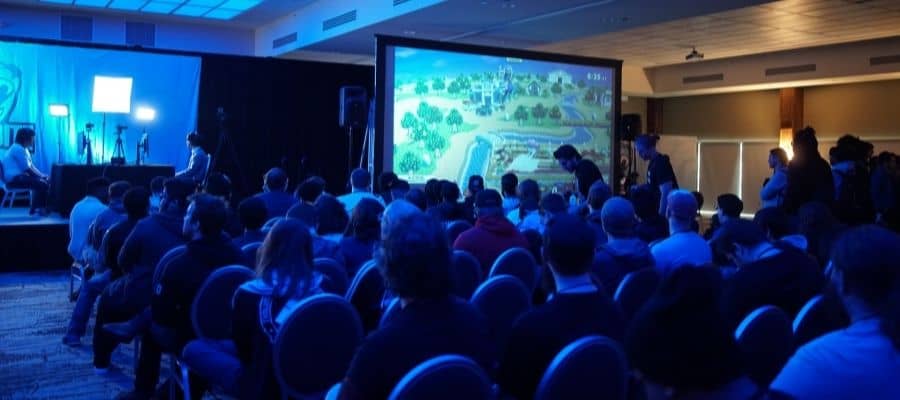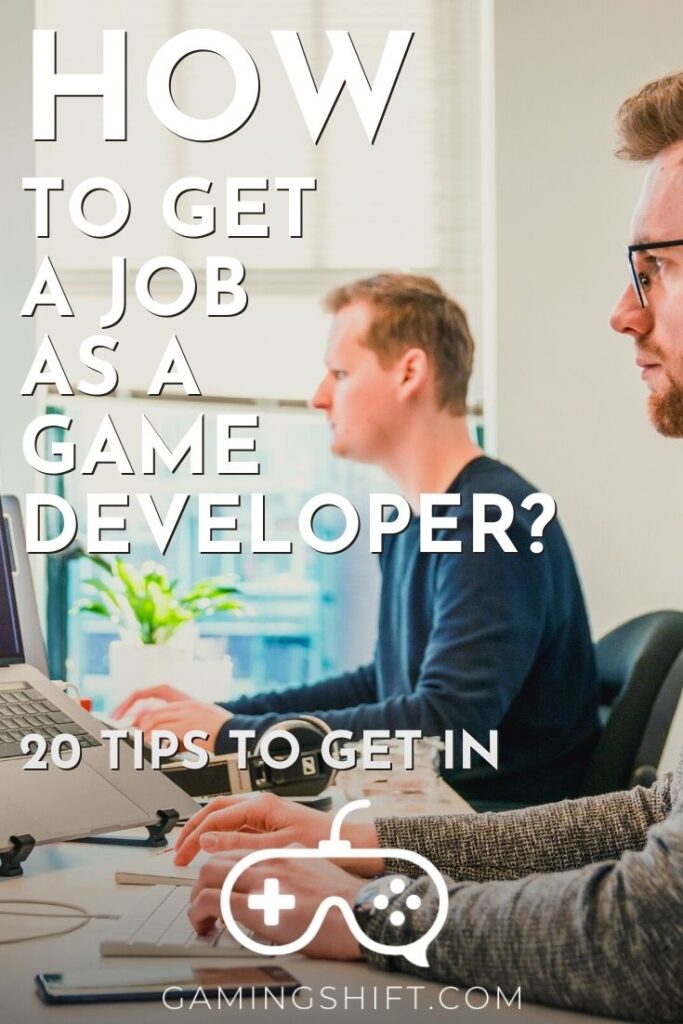Game Designer 8 Tips To Land A Job In Games
Making video games sure seems like a fun job on the surface, right? When you see millions of people worldwide enjoying themselves by playing your creation that you poured so much time and passion into, it makes you feel like you've accomplished something extraordinary.
There aren't many jobs out there that allow you to touch people's minds the way gaming does. Gaming is truly a unique form of art, one in which the player feels as though they are a part of the world. And not just watching the plot unravel from the outside like they would in a movie.
Besides, the job of a game developer can be quite lucrative if we talk about the monetary aspect. According to a Kotaku article from way back in 2014, the average annual compensation for game developers in the U.S. was $83,060. Programmers were on top of the earnings chart, making an average of over 93,000 dollars per year. They were followed by artists and animators who made an average of $74,349 per annum. Producers and game designers earned $82,286 and $73,864, respectively.
Clearly, being a game developer is a well-paying job, and you get to create video games for a living which is probably the most exciting job in the world for a nerd. But things aren't so simple once you look past the glamor and revenue figures.
This is an extremely competitive field, and there are clear distinctions between large game studios and small indie devs. While a job as a game programmer in EA or Ubisoft can net you a ton of cash and lucrative career options, the situation as a solo indie dev isn't all candy and roses.
You have to hustle as an indie dev, scrounging for whatever you can get in the hopes that a publisher will take an interest in you one day. Landing a dream job in a large game company isn't easy. You will need a combination of things in order to get the attention of HR at the job interview- qualifications, experience, people skills, and a nice portfolio.
The Various Types Of Game Development Jobs

The phrase "game developer" covers a broad range of job descriptions. Generally speaking, you could be any one of these.
- Animator: You draw the game characters and animate the 3D models
- Designer: You come up with game concepts, level designs, etc. while coordinating the animators, sound engineers, and programmers to achieve your artistic vision for a game.
- Programmer: Your job is to write the code underneath all the graphics and animations to bring the whole game together. You create and customize game engines while working in collaboration with designers and artists.
Each one of the game development jobs we listed above can be split into dozens of sub-categories. For instance, just the area of game programming in itself can consist of numerous specializations and sub-disciplines. You have AI programmers, physics engine programmers, scripters, gameplay programmers, UI programmers, network programmers, etc.
The role you apply for will depend on your education, personal preferences, and prior experience. But our article is focused on helping you get a job in the game development industry, irrespective of the sub-discipline you choose. So here are our top 20 tips on how to get a job as a game developer.
Related Post
If wish to know how hard game development is before you get into this industry. Then you need to check out my post How Hard Game Development\Design Is And Does It Worth It?
Build Up Your Math Skills

Game coding involves using logic and mathematical functions to instruct the computer on how to perform a given task. You will need an understanding of linear algebra and basic algorithms if you want a degree in video game programming.
Having taken a high school course in trigonometry, physics, and calculus also helps. If you lack any of these skills, try taking the relevant courses for them in your college years.
You Need A Relevant Bachelor's Degree

A college degree isn't exactly a must-have in order to design your first game as an indie dev. But if you're applying to an AAA developer such as EA or Activision, it will definitely come in handy. According to the U.S. Bureau of Labor Statistics, most game programmers have bachelor's degrees in computer science or computer engineering.
Having a degree in philosophy or gender studies won't help you out if you're trying to create the next Call of Duty, so try to choose relevant courses while in college. Take classes in C++, calculus, object-oriented design, game algorithms, computer graphics, etc. You can also take online courses on game programming in addition to what you learn in college.
Develop A Portfolio

According to senior technical staff from Blitz Games Studios, a good portfolio must comprise several small games that can be played from start to end. Make sure to include download links for all the installation software that is needed in order to run your games.
Include screenshots of important game levels or scenes to use as a backup if the software is not available for download. Not to mention, your portfolio must include the source code for all your games. Include credits for any collaborators in the design of your games which helped you out with graphics, programming, presentation, etc.
Try And Get An Internship First

You want to get an inside look at the gaming industry from a developer's perspective, and game companies want cheap workers. Working as an intern is the perfect way to kickstart your career as a game developer. And, you don't really need a well-established portfolio. Startups and indie devs won't ask you to show up with a fully functional game if you just want an internship.
Most game studios don't have "official" internship programs, so you need to keep searching. They are looking for part-time inexpensive labor to polish away rough edges on games, so you might get lucky if you show up at the right time. In order to be selected as an intern, you need to have some kind of skill that is useful to the company- audio engineering, level design, coding, etc.
Apply For An Entry Level Position

This one is a little hard since you've got a ton of competition to go through before you can land a job at a large game company. Most studios require at least 3 to 4 years of experience before hiring you for a project, and experience is hard to come by if you don't have a job.
A lot of programmers find their first job at startups or indie companies, developing mobile games before they get noticed by higher-ups at a large game studio. Get on developer blogs, forums, etc., and try to build contacts with senior game devs working in well-established studios. The nice thing about having insider contacts is that you often get information on job listings that cannot be found on public job listings.
Advance To Become A Software Developer

Once you've accumulated enough experience as a programmer, you can step up to become a developer. In this job, you spend more time designing games and conceptualizing stuff instead of actually writing code. Try to get help from mentors such as senior developers who will show you the ropes and give you valuable advice.
Attend coding boot camps to bolster your programming skills, and keep practicing while under the mentorship of a senior dev. Unlike programmers who are usually restricted to just coding, developers are exposed to the business side of game development. This will help you improve your marketing and customer interaction skills, which opens up new job opportunities.
Plan A Career Path

Within the giant sphere of game development, there are multiple specializations and subdomains. Let's take game design, for example- you could be a level designer, lead designer, content designer, etc. Companies will hire you based on the field you're most proficient in, and they will see if your portfolio makes sense.
You can't apply for an animator position if all the stuff in your portfolio points towards sound design. Before you get started on the career path of a game developer, consider which type of developer you want to be. This will help you learn the most useful skills and filter out all the unimportant stuff.
Make Something

Valve's Chet Faliszek advises that the single best way to get a job in the gaming industry is to simply "make something." It can be a mod, a complete game, or a proof of concept. However, you must get your feet wet by creating something.
This will give you much-needed experience, add to your portfolio, and help you get an idea of what skills you need to learn. On top of all that, a well-made indie title could potentially attract the attention of large publishers or game studios. Valve encourages people to create their own games as a hobby, which is why they launch game development tools and SDKs for free.
Valve also reaches out to people if they find their project interesting. For example, they recently contacted the developer of Auto Chess, a mod for Dota 2. The devs over at Valve loved this mod and would play it all day.
So they decided to come up with their own standalone version of the game, in collaboration with Dorado Studio, the creator of the mod. And that is how Dota Underlords was born, a game that accumulated more than a million downloads on Google Play within a matter of weeks.
Post Your Work On Discussion Boards

As an aspiring game developer, you probably lurk around on discussion boards and forums, searching for helpful tips from experienced devs. Guess what? Senior game developers also visit these boards.
If you post a sample of your work, chances are they might see it and recommend you for a position in their company. If nothing, you will at least built industry connections that can come in handy in the future. Check out TIGForums, indiegamer, r/gamedev, etc.
Create A Blog

If you want to get started in the video game development industry, sometimes all you need to do is put yourself out there for everyone to see. Through a blog, you can share your game development experience and include links to projects you're currently working on.
Have you finished any small games prior to this? You can also link those in your blog and even design an online portfolio so anyone visiting your blog can take a look at your qualifications and past experience as a developer. If you're interested in applying for the position of an artist, upload your art galleries on DeviantArt and Pinterest.
Attend Game Developer Conferences

While LinkedIn is the #1 place where recruiters go to search for talent online, real-life events are your best chance for meeting these recruiters face to face. Talking of events, the GDC is something you cannot miss. This is the world's largest event for game industry professionals, where they get to meet each other and exchange ideas.
The next GDC will be held from March 16 to 20, 2020, in San Francisco. Famous developers, artists, and management gurus will attend this event to share their knowledge. And you will be able to meet up with a wide variety of game developers from different parts of the world.
Bring your portfolio, business card, resume, etc., because there is a high chance of running into a recruiter or industry insider. There will be workshops, demos, panels, Q&A sessions, etc., so keep an eye out for this event each year.
Participate In Game Jams

A game jam is basically like a hackathon or coding contest for game developers. You get to compete against rival devs in a race to create the best game within a specified time period, which is usually between 24 to 72 hours.
More than anything else, game jams are a public event where you get to socialize with fellow developers and test your skills against them. Nobody here is aiming to create well-thought-out, highly polished products. But game jams are a great way to get your name out there and build up street cred.
Between all the anxiety, sleep deprivation, spaghetti code, arguments, and energy drinks, some teams manage to piece together a prototype that shows promise. And this may evolve into a hit game in the future if a publisher happens to take an interest in the prototype. There have been a few cases of people getting recruited for game development jobs based on their performance in game jams.
Try To Gain New Skills

Alongside knowledge of all the latest frameworks, you need to develop your analytical abilities and backend designing skills. Experience with a video game engine is also important, and right now is a great time to be familiar with Unity 3D.
You should have a decent understanding of math. The ability to do matrix transformations and complex calculations will come in handy while working on 3D games. And let's not forget familiarity with languages such as C++, C#, Python, etc. The game industry is constantly evolving to take advantage of the latest hardware developments, so you should try and stay ahead of the curve if you don't want to be left behind.
Follow The Latest Market Developments

The gaming industry is evolving faster than Usain Bolt, running a 100m sprint. There are significant developments in gameplay mechanics, graphics design, and hardware happening on a yearly basis. We are on the brink of a significant shift in console capabilities, with the PlayStation 5 and Xbox Scarlett about to be released next year.
These consoles will feature the latest Zen 2 cores combined with Navi GPU technology, which should allow developers to do things that are inconceivable on current-gen machines. Raytracing and VR are gaining traction in the industry, and the push for better visuals is stronger than ever.
Cloud-based gaming is also on the rise, with Google Stadia and Microsoft XCloud being announced earlier this year. Keep track of the latest developments in technology, and update your portfolio accordingly. Learn new languages, get yourself familiarized with the most popular game engines, and check out developer forums to get info on which skills to learn.
Learn About Your Employer

Read the job description carefully, examine the requirements, and apply if you think you're a good match. Research the type of games a company makes, and edit your portfolio accordingly.
For example, let's assume you're applying for the position of a game artist. The company you are targeting is known for creating cute, cuddly characters with an anime aesthetic. But all your portfolio contains is the artwork of highly detailed, blood-covered monsters doing violent stuff. You can imagine this not going down well with HR during an interview.
Even if you know how to create cute characters but don't include them in the portfolio, the company will assume you are incapable and reject your application. Similarly, if the job offer calls for a 3D artist and you show up with a bunch of 2D specimens, it won't land you a job. In addition, go on sites such as Glassdoor to learn about the salaries, work ethic, etc., within a particular company.
Apply Around 6 – 8 Months Before Release

Timing matters if you're a college graduate with limited experience trying to land a job with a AAA dev. At the start of a game's development process, giant publishers such as EA and Ubisoft will be looking for experienced designers and lead programmers with plenty of experience. As a recent graduate, your skillset is somewhat limited, and you lack experience. The company is looking for someone to steer the development process, not another junior programmer.
However, if you apply 6 to 8 months before the release date, you will have a higher chance of being selected. At this point in the games development phase, smaller tasks are beginning to pile up since everyone at the higher ranks is pushing the team to meet a deadline.
They just want to get the main stuff in order first; therefore, smaller tasks like building props and rigging destructible environments will be put aside temporarily. Tasks like these can be taken upon by junior developers, which is why you want to show up at just the right time.
Apply Even If There Is No Job Listing

Similar in concept to our last point. When deadlines get closer, everyone is rushing stuff and focusing on the most urgent tasks. Even if a job isn't listed on the company's website, you might be able to offer them a ready-made solution to a staffing shortage that the recruiter hasn't thought about just yet. Basically, the company itself doesn't know if it needs your services right now. So your best bet is to contact them, and you might just get lucky.
Be Concise And Specific

Sometimes, less is more. Including too many pieces of work in your portfolio is not recommended since it will result in a giant cluttered mess. All you need is two or three of your best projects. Don't show up with 10 games that are all reskinned variations of one another just to artificially inflate the numbers.
As for our second point, you need to be specific regarding what you want to showcase in your portfolio. Target a certain niche because studios will hire people to fill certain gaps in their production. Are you good at environments? Focus on that in your portfolio. If character modeling is your strength, use that to showcase what you can do. Instead of throwing in a bit of concept art here and a bit of animation there, focus on what you're actually good at.
Accuracy Matters

Before applying for a job, make sure to read the guidelines thoroughly. Did the company ask for a cover letter? If the answer is no, you shouldn't send one. By doing something that is not asked of you, you're setting yourself up for failure.
First of all, it shows that you lack attention to detail and the ability to follow instructions. Secondly, someone at HR might read your letter and start nitpicking about stuff like missing periods and punctuation errors. Keep it brief; stick to a resume + portfolio. A company that wants to hire a Maya animator doesn't need to know about the medals you won in football while in high school.
Practice, And Then Practice Some More

Constantly look up online resources and spend your spare time reading books. Practice until you can code live, on the spot, in front of your interviewer when you apply for a job. You should be so used to it that you can start contributing to the company right from the first day. While, in reality, you will acquire most of the skills needed to be productive through onsite experience, employers want you to be useful from day one. Even as a junior developer.
Conclusion
How easily you land a game development job depends entirely on your skillset, prior experience, and mentality. If you're fresh out of school, have zero experience, never created any game art, or have a bad attitude towards team members, no company will take you seriously.
On the other hand, if you've got a solid portfolio and an eagerness to learn, HR will definitely take an interest in you. Communication skills are just as important as a degree, and you need to be updated with the latest trends in gaming.
What skillsets are companies looking for right now? While being proficient in languages such as C++, C#, Python, etc., is required, soft skills are just as important. Building connections with insiders and influential people are precious, so attend game developer conferences and start networking.
Talk on forums with fellow developers, join Facebook groups and get active on LinkedIn. Read some books, play around with Unity, and tap into the massive library of free online tutorials (Udemy, Youtube, etc.).
And finally, we arrive at the fun part- actually playing games. In order to become a great master, you must first look at things from the perspective of a student. Play all types of games, even the ones that you don't like, and play them with a purpose. Try to understand why a developer did a certain thing and how you could've improved upon it. It is very easy to get lost playing games all day when you should be taking notes. But hey, all of us can have a little fun with our jobs. Especially game developers.
If you found this article useful, you may want to save this pin below to your Gaming board.

Game Designer 8 Tips To Land A Job In Games
Source: https://gamingshift.com/game-developer-job/
Posted by: shawuponce.blogspot.com

0 Response to "Game Designer 8 Tips To Land A Job In Games"
Post a Comment